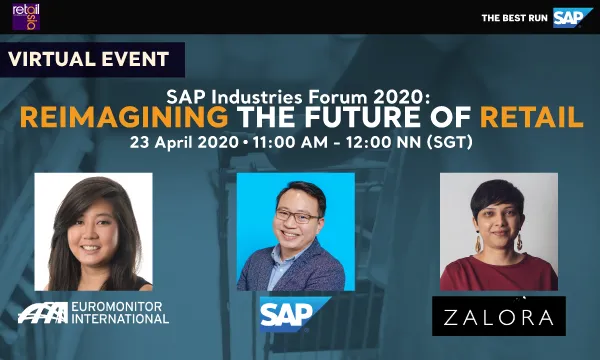
SAP Industries Forum lays out the groundwork for retail's future
Euromonitor expects global consumer expenditure to double to US$84t by 2030.
The sudden influx of online traffic due to the new norm of social distancing and circuit breaker measures has created a dramatic shift across industries, more so evident in retail. The hours sitting at home has seen gray consumers forced to shop online for the first time to purchase essential goods, as well as a surge in demand for fitness, DIY and personal care products to cope with the monotony of being on quarantine.
On 23 April, software specialist SAP, in collaboration with Retail Asia, hosted a 60-minute webinar entitled SAP Industries Forum: Reimagining the Future to talk about what’s happening in the world of retail.
Tomorrow’s shoppers
Estelle Yang, senior business development manager at market intelligence firm Euromonitor, started her session by providing a general profile of Gen Z shoppers, who are more ethical and conscious when it comes to their purchases. With consumer expenditure expected to double by 2030 from US$48t to US$84t, she cautions advertisers to avoid any cliche advertising to appeal to Gen Z, who are also more multicultural and sensitive to gender biases.
Emphasising the ongoing shift to a circular economy, Estelle shared a few use cases on technologies that are keeping up with the pragmatic nature of future shoppers, including mobile app Karma, which allows users to buy surplus food at half the price to reduce wastage.
In Europe, Norwegian supermarket operator Extra has introduced unmanned shopping during off hours. Consumers can gain access to an unmanned store through Extra’s mobile app, and identity verification is matched using the Norwegian bank ID system. Customers are then free to roam and pay for their groceries using the automated checkout.
Sustainability perspective
Picking up on the first session was ZALORA’s CEO, Gunjan Soni, who revealed that majority (54%) of Gen Z shoppers are willing to spend another 10% on sustainable products, with 50% of millennials echoing the same sentiment. However, the CEO mentioned that despite the dire need to focus more on sustainability, the retail fashion industry accounts for 10% of global carbon emissions, with 73% of the clothing produced after usage ending up in landfills.
To address this, ZALORA is now offering pre-loved items in its platform to cater to more conscious individuals and to ignite such an advocacy for the industry. The company is also building a repository of sustainable tagging from materials, processes to sourcing practices, to serve us a benchmark for other brands to follow. As ZALORA aims to seek transparency throughout the entire supply chain, consumers can easily identify and purchase products that incorporate sustainable materials. “We realized that it's just not enough to audit and select or reject some factories, it's also very important to educate and to help them remedy their actions. “Simply put, we want to be the leaders in helping our factories produce correctly,” Gunjan said.
Customer focus
Rounding up the lineup of speakers was Aditya Utama, SAP Southeast Asia’s retail industry business architect, who delved into the importance of adopting a customer-centric mindset within retail organisations. Apart from integrating multiple touchpoints, he said that this transformation would entail a cultural change that would involve every department, stakeholder, and frontliner onboard.
As technology adoption moves beyond product specifications and leans towards the overall customer experience, the question is, are retailers equipped throughout their entire value chain to achieve this? Aditya shared SAP’s framework wherein business decisions are supported by operational and experiential data. By properly integrating physical and digital touchpoints to gather feedback, as well as carefully identifying key metrics to drive engagement, Aditya cited how retailers, whether in-store or online, can plan the assortment and allocation of products or services that would give added value to customers.
New reality
With the unprecedented revenue shortfall due to heightened store closures and social distancing measures across the Asia Pacific region, SAP explained that the webinar was aimed at addressing the main concerns for retail companies during these trying times to help cope with the new reality.
Today’s retailers have witnessed disruptions in the supply chain due to national and regional restrictions on movement resulting in non-availability or delivery delays, a spike in air freight demand to expedite delivery as well as limitations in third-party capabilities for last mile delivery. SAP is pushing forth measures to secure the supply of essential goods, stabilise the supply chain to ensure better inventory management, and serve the community through cashier-less payment processes.
During the Q&A session, the round of speakers discussed the shifts in work arrangements as well as purchasing habits due to the pandemic. Aside from the spike in demand for essentials, preference is shifting towards tops and comfortable clothing wear, as well as baking tools, fitness equipment, DIY and personal care products. In China and South Korea, where confinement is steadily being lifted, a form of “revenge spending” is picking up particularly in the luxury goods category. As consumers wake up to a new reality post Covid-19, the speakers expect that the industry as a whole may be in a good position to bounce back, but industry collaboration and technology adoption will play a pivotal role to realise a sustainable and pragmatic future.



















 Advertise
Advertise






